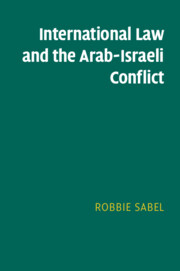Book contents
- International Law and the Arab-Israeli Conflict
- International Law and the Arab-Israeli Conflict
- Copyright page
- Contents
- Abbreviations
- Introduction
- 1 Is International Law Relevant?
- 2 The World War I
- 3 The Zionist Movement and the 1917 Balfour Declaration
- 4 Post–World War I and the 1922 League of Nations Mandate for Palestine, 1920–1947
- 5 The 1947 Partition Plan
- 6 Israel’s Declaration of Independence
- 7 The 1948 Arab-Israeli War
- 8 1949 Armistice Agreements
- 9 The Arab Refugee Problem
- 10 The 1967 Six Day War
- 11 UN Security Council Resolution 242
- 12 Camp David 1978
- 13 1979 Egypt–Israel Peace Treaty
- 14 Taba Arbitration
- 15 The Legality of Israeli Exploitation of Oil from Sinai
- 16 The Oslo Accords
- 17 Israel–Jordan
- 18 Post Oslo Developments
- 19 The Status of the ‘West Bank’ (Judea and Samaria) and the Gaza Strip
- 20 Israeli Settlements in the West Bank
- 21 Controversial Elements of Military Administration
- 22 Freedom of Navigation through International Waterways in the Region
- 23 Israel–Syria
- 24 Jerusalem
- 25 Controversial Laws of War Issues
- 26 Is Palestine a State?
- 27 Water Resources
- 28 Implications for Future Negotiations
- Index
14 - Taba Arbitration
Published online by Cambridge University Press: 21 April 2022
- International Law and the Arab-Israeli Conflict
- International Law and the Arab-Israeli Conflict
- Copyright page
- Contents
- Abbreviations
- Introduction
- 1 Is International Law Relevant?
- 2 The World War I
- 3 The Zionist Movement and the 1917 Balfour Declaration
- 4 Post–World War I and the 1922 League of Nations Mandate for Palestine, 1920–1947
- 5 The 1947 Partition Plan
- 6 Israel’s Declaration of Independence
- 7 The 1948 Arab-Israeli War
- 8 1949 Armistice Agreements
- 9 The Arab Refugee Problem
- 10 The 1967 Six Day War
- 11 UN Security Council Resolution 242
- 12 Camp David 1978
- 13 1979 Egypt–Israel Peace Treaty
- 14 Taba Arbitration
- 15 The Legality of Israeli Exploitation of Oil from Sinai
- 16 The Oslo Accords
- 17 Israel–Jordan
- 18 Post Oslo Developments
- 19 The Status of the ‘West Bank’ (Judea and Samaria) and the Gaza Strip
- 20 Israeli Settlements in the West Bank
- 21 Controversial Elements of Military Administration
- 22 Freedom of Navigation through International Waterways in the Region
- 23 Israel–Syria
- 24 Jerusalem
- 25 Controversial Laws of War Issues
- 26 Is Palestine a State?
- 27 Water Resources
- 28 Implications for Future Negotiations
- Index
Summary
The award of the arbitrators in the Taba case has been subject to criticism on the grounds that the arbitrators based their decision on existing markers on the ground and refrained from examining when the markers had been placed and by whom and whether their siting was in accordance with the legal boundary. Nevertheless, it was a landmark case in that for the first, and so far only time, Israel and a neighbouring Arab State settled a border dispute by means of an international arbitration. States usually go to arbitration only on matters that they do not consider to be of fundamental importance and losing would not have far-reaching consequences. This is true of the Taba dispute, which involved a dispute of some 250 metres of shoreline.Professor Lapidoth summarises that for political and perhaps even psychological reasons the two parties attributed to this dispute much more weight than was objectively reasonable.
Keywords
- Type
- Chapter
- Information
- International Law and the Arab-Israeli Conflict , pp. 251 - 259Publisher: Cambridge University PressPrint publication year: 2022

